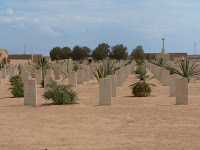Werner arrived at breakfast that morning with his suitcase all packed and ready to go. We were not surprised – he seemed to forget everything Ruth told him or else he did not hear her. He had probably lost his itinerary too.
Our city tour was delayed slightly because Mona, our local guide, had got stuck in traffic. She arrived wearing Muslim dress with her hair and neck covered by a blue and a white scarf, carefully arranged so that both colours were showing. She wore a full length brown robe and gloves, although she did take the gloves off from time to time. She told us that she had only been wearing these clothes for 10 years and before that had just walked around in western clothes. Then people started to feel that they needed to assert their Muslim identity and more and more women began to cover up when going out in public, including teenagers. Nowadays, very few women wore western clothes, although Mona just wore jeans and t-shirts at home. She said that the scarf had become a real fashion statement, with women and especially young women trying to outdo each other in the way that they tied their scarves, including using multiple scarves like Mona herself. The new fashions also meant that scarves were often co-ordinated with outer clothes. While we were walking around Alexandria in temperatures well above 30oC, I noticed some young girls wearing tight fitting, polar neck, long sleeved, polyester jerseys to cover their arms and yet they did not seem to feel the heat as much as us. Despite their modest dress, which did not really hide that much of their figures, they were behaving very affectionately towards their boyfriends.
The first stop on our city tour of Alexandria was the catacombs. There were not many people there when we arrived and Mona took her time to explain how the catacombs were started and how they were arranged. Though way upstream, the Aswan dam had caused the water table to rise, which meant that the third and lowest level of the catacombs was now fully submerged and there was some flooding on the second level. Mona also knew a lot about her subject and tried to tell us everything. A few groups of people overtook us and we had to wait for them to move on to enter some rooms. When we got to the far room on the second or main level, there was a terrified kitten inside. Sue was called and she rescued the kitten, wrapping it in her scarf and then taking it back up to the surface.
When we came out of this room, the stairs and hallway behind us were completely full of people and there was some pushing. I started to feel uneasy when Mona led us into a side room with a completely flooded floor and only a few wobbly planks to walk on. It would only take a couple of overly large tourists to come in behind us for the planks to break, so I yelled out that I was getting out of there and hoped that someone else in the group heard me.
Once the decision was made and I had left the room, there was no turning back. The crush of people would not have allowed it. It was quite scary, fighting my way through the hoards. As I climbed the stairs, I could hear people complaining about having to wait and wondering what the delay could be. Both flights of stairs and the first level were full. I was so relieved when I broke through into the sunlight. Despite the crush underground, there was still a long queue of people waiting to go in. I was appalled because it was such a safety risk. Several cruise ships had arrived and disgorged their passengers and this had created the huge numbers of tourists on the site. Cruise ships tend to have elderly passengers and there was potential for serious problems if someone had fallen or had a heart attack or similar. How could anyone to get down to help them? There could have been a stampede and people could have been seriously injured.
I spotted Sue and she took me to the office where she had left the kitten. She had offered to give them money for food, but the girl in the office would not accept it. The kitten was already enjoying a meal and the girl told us that they had sent out for some fish. It looked like the kitten was going to be spoiled.
We walked back so we could see the entrance to the catacombs and spotted Kim and Ruth. Kim was really angry about how cavalier the organisers were about the danger level with the numbers of people underground. He went to speak to someone about it, but no one was bothered at all and the queues did not diminish. At long last the rest of our group emerged from the gloom and we found the bus.



















































